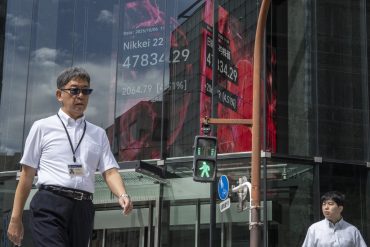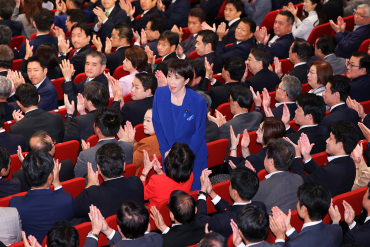
- Economic Policy
- Fiscal Expansion
- Nikkei 225
Nikkei 225 Hits Record High After Takaichi's LDP Leadership Win
5 minute read

Japanese Stocks Surge to Record High as Markets Bet on Stimulus-Driven Tech Boom Under Takaichi.
Key Takeaways
- The Nikkei 225 rocketed 4.89% to close at 48,128.45 on Monday, shattering records for the first time above 48,000 after Sanae Takaichi’s landslide Liberal Democratic Party leadership win, paving her path to become Japan’s first female prime minister later this month.
- The yen tumbled 1.72% to 150.12 per dollar, as traders baked in Takaichi’s dovish fiscal push delaying Bank of Japan hikes and fueling export plays.
- Japan confronts a stark 2025 IT talent gap of 220,000–369,000 workers, per Ministry of Economy, Trade and Industry estimates, risking bottlenecks in the AI and digital overhaul at the heart of Takaichi’s “high-pressure economy” blueprint.
Introduction
Japanese equities unleashed their fiercest rally in months on October 6, 2025, with the Nikkei 225 exploding 4.89% to a historic close of 48,128.45 as global investors doubled down on Sanae Takaichi’s vow to supercharge stimulus amid the archipelago’s epic bull run—now the longest in three decades. The benchmark’s breach of 48,000 capped a weekend seismic shift: Takaichi’s commanding LDP presidency triumph, which catapults the ex-Economic Security Minister—long a fierce Abe protégé—into the premiership when lawmakers reconvene October 15.
Wall Street’s roar echoed Tokyo’s, but the yen’s slide and bond wobbles underscored a uniquely Japanese bet: Takaichi’s fusion of bold fiscal firepower and BOJ dovishness will turbocharge tech bets and digital reinvention, even as peers like the Fed pivot to restraint.
Key Developments
Gains cascaded across the board, but industrials and tech stole the spotlight on visions of Takaichi-fueled capex bonanzas. The Japan Steel Works vaulted 14.63% to ¥9,784, while Mitsubishi Heavy Industries and Kawasaki Heavy Industries powered ahead 13.12% to ¥4,174 and 9.38% respectively—bets on amped infrastructure and defense outlays under her security hawkery.
Takaichi’s “high-pressure economy” mantra—laser-focused on wage surges and investment floods to shatter deflation’s grip—dovetails masterfully with Society 5.0, the LDP’s flagship quest to weave AI, IoT, and big data into every societal fiber for hyper-resilient growth.
The BOJ, Takaichi’s tacit ally, sticks to gradualism: Crédit Agricole CIB pencils in a lone 25 basis-point nudge by January 2026, safeguarding cheap credit for her innovation blitz while easing pandemic-era props.

Market Impact
The Topix echoed the frenzy, vaulting 3.10% to a fresh zenith of 3,226.06—proof this isn’t froth, but faith in earnings tailwinds from Takaichi’s playbook. The yen’s 1.72% plunge past 150 per dollar cemented loose-policy pricing, juicing exporters from autos to semiconductors, with trading volume on the Tokyo Stock Exchange exploding to a record 5.2 trillion yen—the highest in over two years—amid heightened foreign inflows chasing the stimulus narrative.
Semiconductor and tech heavyweights amplified the surge, as the sector index leaped 5.8% on expectations of elevated R&D subsidies, spilling over to global peers with U.S. chip futures advancing 1.9% in after-hours trade. Bonds bent but didn’t break: the 30-year JGB yield spiked 13 basis points to 3.291%—flirting with September’s peak—while the 20-year climbed 7 basis points to 2.68%, pricing Takaichi’s growth juice sans inflation fire, though the move prompted a modest rotation out of duration-sensitive utilities into cyclicals.
Asia yawned by comparison: Australia’s S&P/ASX 200 slipped 0.07% on holiday-thinned volumes, while Hong Kong’s Hang Seng futures drifted to 26,979 (-0.74%), idled by mainland and Seoul closures. Nonetheless, the Tokyo tremor rippled westward, lifting European Stoxx 600 futures by 0.4% pre-open as yen depreciation bolstered multinational earnings outlooks for luxury and auto giants.
Strategic Context
Takaichi’s coronation syncs with Japan’s digital sprint: state mandates rolling out 5G, IoT grids, and AI enhancers to counter demographic drags and retrofit rustbelt giants, eyeing parity with U.S. and Chinese tech titans. The Cabinet’s June 2025 Priority Plan for Digital Society Advancement outlines bold investments in data infrastructure and cybersecurity, aiming to fully realize Society 5.0 by embedding digital twins across economic sectors for seamless human-tech integration. This includes targeted R&D funding exceeding ¥1 trillion annually to pioneer smart cities and cross-border data flows, positioning Japan as Asia’s connectivity vanguard under Takaichi’s innovation mandate.
Cloud uptake hit escape velocity at 87% enterprise penetration by late 2023, per Red Hat surveys, unlocking analytics goldmines. 5G users ballooned to 70 million by mid-2025—over 70% of mobiles—priming smart factories and urban webs for Takaichi’s efficiency crusade.
Venture vibes pulse stronger, luring FDI into robotics and health tech; with 2,268 tech scaleups raising $46B cumulatively and a government target of 100 trillion yen in FDI stock by 2030, Takaichi’s tax perks and red-tape razors could ignite this, contingent on talent pipelines via visas and JV bridges. Regional hubs like Yokohama are amplifying this with FY2025 subsidies up to ¥3 million for inbound firms in growth sectors, fostering a decentralized ecosystem beyond Tokyo’s gravitational pull.

Challenges Ahead
Structural thorns loom large. METI pegs 2025’s IT void at 220,000–369,000 heads, ballooning to 790,000 by 2030 as AI/cyber thirst explodes—stifling Takaichi’s vision absent aggressive upskilling. Compounding this, the looming “2025 Cliff”—a METI-identified crisis of legacy IT systems—threatens annual economic losses up to ¥12 trillion unless accelerated modernization efforts bridge the gap in outdated infrastructure and expertise. Moreover, Takaichi’s appetite for expansive fiscal stimulus risks exacerbating Japan’s already ballooning public debt, which exceeds 250% of GDP, as bond yields climb on fears of unchecked deficit spending amid a minority government coalition.
Keiretsu are pivoting to globo pacts in AI, bots, and telemed, snagging expertise and IP flows—but sparking sovereignty jitters in crown-jewel fields. Pay parity lags FAANG lures, spurring exoduses; Takaichi floats retention tweaks, but LDP old guard’s inertia could blunt reforms.
Conclusion
Tokyo’s tape has thundered approval for Takaichi’s ascent: stratospheric stocks and yen frailty scream stimulus perpetuity and acceleration under her watch. Yet, as Japan grapples with entrenched issues like sluggish 1% annual GDP growth, industrial erosion, and rigid labor markets, Takaichi’s success will hinge on forging consensus in a fractious minority parliament to enact the structural overhauls needed for sustainable revival.
Fulfillment hinges on her deft dance—marrying easy money with debt discipline, igniting startups sans alienating incumbents, and magnetizing minds while safeguarding harmony. Bulls, for one, are all-in on her winning hand.








